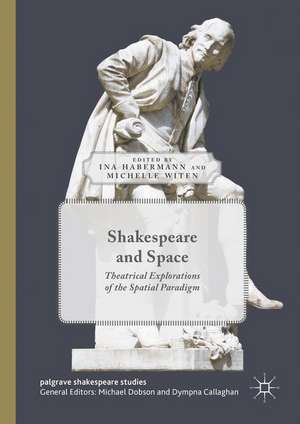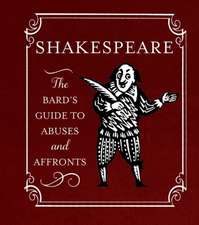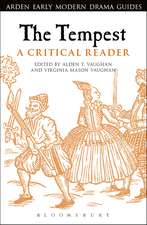Shakespeare and Space: Theatrical Explorations of the Spatial Paradigm: Palgrave Shakespeare Studies
Editat de Ina Habermann, Michelle Witenen Limba Engleză Hardback – 19 apr 2016
Din seria Palgrave Shakespeare Studies
- 17%
 Preț: 360.76 lei
Preț: 360.76 lei -
 Preț: 390.63 lei
Preț: 390.63 lei - 20%
 Preț: 628.22 lei
Preț: 628.22 lei - 15%
 Preț: 644.95 lei
Preț: 644.95 lei - 15%
 Preț: 696.50 lei
Preț: 696.50 lei - 15%
 Preț: 701.06 lei
Preț: 701.06 lei -
 Preț: 389.70 lei
Preț: 389.70 lei -
 Preț: 388.13 lei
Preț: 388.13 lei - 15%
 Preț: 582.12 lei
Preț: 582.12 lei -
 Preț: 381.81 lei
Preț: 381.81 lei - 18%
 Preț: 945.14 lei
Preț: 945.14 lei -
 Preț: 385.25 lei
Preț: 385.25 lei - 15%
 Preț: 698.94 lei
Preț: 698.94 lei -
 Preț: 390.63 lei
Preț: 390.63 lei -
 Preț: 393.52 lei
Preț: 393.52 lei -
 Preț: 195.69 lei
Preț: 195.69 lei -
 Preț: 389.88 lei
Preț: 389.88 lei -
 Preț: 383.33 lei
Preț: 383.33 lei - 15%
 Preț: 637.13 lei
Preț: 637.13 lei -
 Preț: 384.48 lei
Preț: 384.48 lei - 15%
 Preț: 585.04 lei
Preț: 585.04 lei -
 Preț: 390.63 lei
Preț: 390.63 lei - 15%
 Preț: 579.52 lei
Preț: 579.52 lei -
 Preț: 392.60 lei
Preț: 392.60 lei -
 Preț: 385.84 lei
Preț: 385.84 lei -
 Preț: 386.99 lei
Preț: 386.99 lei - 18%
 Preț: 787.29 lei
Preț: 787.29 lei - 15%
 Preț: 700.75 lei
Preț: 700.75 lei - 18%
 Preț: 783.68 lei
Preț: 783.68 lei -
 Preț: 382.75 lei
Preț: 382.75 lei - 15%
 Preț: 642.51 lei
Preț: 642.51 lei -
 Preț: 388.52 lei
Preț: 388.52 lei -
 Preț: 387.75 lei
Preț: 387.75 lei - 18%
 Preț: 787.47 lei
Preț: 787.47 lei
Preț: 729.23 lei
Preț vechi: 889.30 lei
-18% Nou
Puncte Express: 1094
Preț estimativ în valută:
139.53€ • 146.21$ • 115.35£
139.53€ • 146.21$ • 115.35£
Carte tipărită la comandă
Livrare economică 12-26 aprilie
Preluare comenzi: 021 569.72.76
Specificații
ISBN-13: 9781137518347
ISBN-10: 1137518340
Pagini: 282
Ilustrații: XV, 282 p.
Dimensiuni: 148 x 210 x 21 mm
Greutate: 0.49 kg
Ediția:1st ed. 2016
Editura: Palgrave Macmillan UK
Colecția Palgrave Macmillan
Seria Palgrave Shakespeare Studies
Locul publicării:London, United Kingdom
ISBN-10: 1137518340
Pagini: 282
Ilustrații: XV, 282 p.
Dimensiuni: 148 x 210 x 21 mm
Greutate: 0.49 kg
Ediția:1st ed. 2016
Editura: Palgrave Macmillan UK
Colecția Palgrave Macmillan
Seria Palgrave Shakespeare Studies
Locul publicării:London, United Kingdom
Cuprins
Lists of Figures, Illustrations, and Appendices.- Notes on Contributors.- List of Abbreviations.- Introduction.- PART I: SHAKESPEAREAN SPACES.- 1. Shakespeare’s Enclaves; Andreas Mahler.- 2. The Theatrical Topology of Tyranny in Richard III; Christina Wald.- 3. Thickets and Beaches: Evoking Place in the Stories of King Lear; Werner Brönnimann.- 4. ‘The Lady shall say her mind freely’: Shakespeare and the S/Pace of Blank Verse; Margaret Tudeau-Clayton.- 5. Hybrid Spaces in Antony and Cleopatra; Elisabeth Bronfen.- 6. The Sea in Pericles; Bernhard Klein.- PART II: MIGRATING SHAKESPEARE, MIGRATING HAMLET.- 7. Universals in the Bush: The Case of Hamlet; Dominique Brancher.- 8. The German Hamlet: Ghostly Encounters in the Space of the Stage and the Novel; Alexander Honold; 9. ‘One cannot act Hamlet, one must be Hamlet’: The Acculturation of Hamlet in Russia; Thomas Grob.- 10. Hamlet’s Mobility: The Reception of Shakespeare’s Tragedy in US-American and Canadian Fiction; Gabriele Rippl. 11. Local Habitations: Hamlet at Helsingør, Juliet at Verona; Balz Engler.- Index.-
Notă biografică
Ina Habermann is Professor of English at the University of Basel, Switzerland. She is the author of Staging Slander and Gender in Early Modern England (2003) and Myth, Memory and the Middlebrow: J.B. Priestley and the Symbolic Form of Englishness (2010).
Michelle Witen is Postdoctoral Teaching and Research Fellow at the University of Basel, Switzerland. Her research interests include Modernist incorporations of musical structure and nineteenth-century newspapers. Her monograph James Joyce’s Absolute Music is forthcoming.
Michelle Witen is Postdoctoral Teaching and Research Fellow at the University of Basel, Switzerland. Her research interests include Modernist incorporations of musical structure and nineteenth-century newspapers. Her monograph James Joyce’s Absolute Music is forthcoming.
Textul de pe ultima copertă
This collection offers an overview of the ways in which space has become relevant to the study of Shakespearean drama and theatre. It distinguishes various facets of space, such as structural aspects of dramatic composition, performance space and the evocation of place, linguistic, social and gendered spaces, early modern geographies, and the impact of theatrical mobility on cultural exchange and the material world. These facets of space are exemplified in individual essays. Throughout, the Shakespearean stage is conceived as a topological ‘node’, or interface between different times, places and people – an approach which also invokes Edward Soja’s notion of ‘Thirdspace’ to describe the blend between the real and the imaginary characteristic of Shakespeare’s multifaceted theatrical world. Part Two of the volume emphasises the theatrical mobility of Hamlet – conceptually from an anthropological perspective, and historically in the tragedy’s migrations to Germany, Russia and NorthAmerica.











